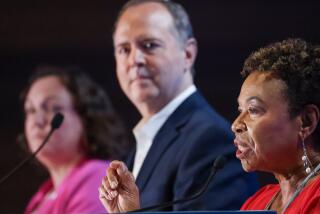Introducing Mr. McDean?
- Share via
WASHINGTON — Two fellow politicians, and their presidential bids, hover over Sen. Russell D. Feingold these days: Howard Dean and John McCain.
Feingold, a Democrat from Wisconsin, had Capitol Hill buzzing last week when he proposed that the Senate censure President Bush for ordering the National Security Agency to bypass the warrant process and spy on communications between people in the U.S. and suspected terrorists abroad.
Officially, Feingold said his resolution was spurred by his firm conviction that Bush broke the law.
“There are moments when the Congress has to assert the rule of law,” Feingold said. “That is the moment when you have to do something ... dramatic.”
Few question the sincerity of that view. But few doubt that Feingold’s move also was colored by his ambition to run for president in 2008. And that has prompted the comparisons to Dean, the former Vermont governor whose opposition to the Iraq war propelled his quest for the 2004 Democratic presidential nomination, and McCain, the Republican senator from Arizona whose embrace of controversial causes fueled his White House run in 2000.
Feingold’s call for censure has had a Dean-style appeal to left-wing Democrats. That section of the party’s base is still deeply opposed to the Iraq war, distrustful of Bush and disenchanted with many elected Democrats, whom they see as unwilling to vigorously challenge him.
And just as they rallied around Dean’s antiwar stance, last week they lauded Feingold’s censure proposal -- even as most of his Democratic Senate colleagues gave it the cold shoulder.
“Team play is always preferred. But if the team isn’t playing, don’t blame a guy for taking matters into his own hands,” said Liberal Oasis, a pro-Dean blog.
Feingold clearly is courting the Dean vote as he positions himself to the left of other Democratic presidential hopefuls. He is reaching out to the Internet-savvy, airing video podcasts on the website for his political action committee and holding an online “listening session.”
“Howard Dean was one of the first people who recognized the power of the Internet as a [political] organizing tool, and absolutely we are picking up that mantle and using those tools,” said George Aldrich, spokesman for Feingold’s PAC.
At first glance, Feingold’s strategy would appear to make sense. Campaign analysts agree the Democratic field of potential White House contenders is dominated by Sen. Hillary Rodham Clinton of New York, who has been staking out territory toward the political center, leaving open the left end of the spectrum. “Basically, the field will be Hillary and the anti-Hillary,” said Jennifer Duffy, an analyst for the nonpartisan Cook Political Report. “There’s this big void out there that needs to be filled. Since [the left wing’s] unhappiness is generally about the war and [the NSA] surveillance, Feingold’s talking to them and they’re listening.”
Whether he can keep their attention remains to be seen. Although he has staked out several stands that earn plaudits from the left -- before his censure idea, for example, he led the charge against renewing some parts of the Patriot Act, the antiterrorism law -- Feingold’s overall record may not be as liberal as some of his more recent supporters might assume.
In September, for instance, Feingold voted to confirm Bush’s pick of conservative John G. Roberts Jr. as the Supreme Court’s chief justice. In 2001, he voted to confirm conservative John Ashcroft’s nomination as attorney general -- the only Democrat on the Senate Judiciary Committee to do so.
Aides explain those votes as expressions of his conviction that presidents should be allowed leeway to pick their own inner circle.
Many Democrats also remember that Feingold broke with his party in a closely watched vote during the Republican-led impeachment drive against President Clinton. Although he ultimately voted for acquittal in the case, Feingold was the lone Democrat to join Republicans in voting to hear the evidence against Clinton.
“I don’t understand -- what is his philosophy that explains why he can be so progressive in some areas and not in others?” asked one liberal activist, who requested that he not to be identified because he deals with Feingold professionally.
One answer offered by other Democrats is that Feingold resembles McCain more than he does Dean.
The two became closely linked on Capitol Hill in the late 1990s as co-sponsors of the campaign finance bill aimed at stemming the flow of large contributions into the political system. Overcoming steep odds -- and strong opposition from key figures within each party -- the measure became law in 2002.
Feingold also charted his own course with the censure resolution, announcing it without giving Democratic Senate leaders advance notice. Many of his party colleagues, though sympathetic to the impulse, believe seeking censure will backfire. They point to the glee with which it was received by conservative commentators, who attacked it as evidence of Democratic fecklessness on national security.
“No one is against his position -- it’s the way he went about it,” said one Democratic consultant, who spoke on condition of anonymity when addressing internal party discussions about the censure issue.
Feingold aides respond by touting their boss’ “independence,” using language often used to describe McCain’s breaks with GOP orthodoxy. Feingold’s call for censure “is the latest in a long and consistent record of ... calling things the way he sees them, without regard to party or politics,” his office said in a statement.
McCain, in eyeing a 2008 presidential candidacy, has worked to soften his reputation as a maverick and win over GOP leaders and donors. That’s where Feingold’s similarities with McCain might end.
“I’m still wondering where he’s going to raise $100 million,” said analyst Duffy, referring to the sum many strategists believe will be needed to mount a serious presidential campaign. “You cannot run a completely Internet-based campaign. The price of admission is still the price of admission.”
More to Read
Sign up for Essential California
The most important California stories and recommendations in your inbox every morning.
You may occasionally receive promotional content from the Los Angeles Times.










